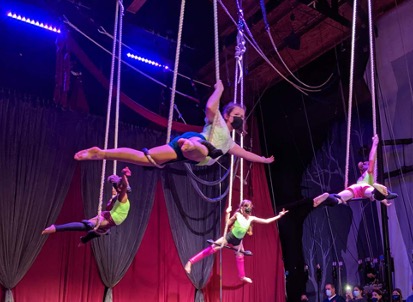At Canopy Studio, they’re floating through air with the greatest of ease, these daring young students on the dance trapeze.
With trapezes, fabrics, slings, ropes and aerial hoops (lyra) hanging from the rafters, it’s quickly obvious this is not your average dance school. Here, people of all ages and abilities can learn the art of aerial dance and performance — movement education that enriches their lives.
A $2,500 Walton EMC Operation Round Up grant is providing movement education for students with disabilities.
Canopy, which occupies a converted cotton warehouse in Athens, offers 70 classes for children and adults each week. It is the largest non-profit aerial dance studio in the Southeast. But size isn’t nearly as important as impact — particularly on children with disabilities, emphasizes Ann Woodruff, executive director of the studio that opened in 2002.
“Trapeze really is more than just hanging upside down and having fun,” she said. “Aerial arts is a recognized medium for bringing happiness, creativity, physical challenge and confidence to those that participate.”

Woodruff, who earned a special education degree from the University of Georgia, joined Canopy as the outreach coordinator in 2008. She is considered an expert on the effects of aerial instruction for children with disabilities.
At normal capacity, Canopy Studio’s outreach program provides therapeutic instruction to about 50 students.
At normal capacity, Canopy Studio’s outreach program provides therapeutic instruction to about 50 students. Those qualifying for the program have documented disabilities ranging from autism to low muscle tone and other health impairments. Most of the students receive one-on-one instruction.
“We have worked very hard to create an outreach program for those who need additional instruction or one-on-one attention,” Woodruff said. The private lessons are provided at no charge thanks to support from donors like Walton EMC’s Operation Round Up (ORU) participants. The $2,500 ORU grant will provide private lessons for 15 students for a 10-week period.
Parents and caregivers have reported that participating in trapeze and movement classes has given their children opportunities to develop strength, listening skills and the ability to sequence tasks. Just as important, emphasizes Woodruff, is that these skills carry over into other parts of their lives once they leave the studio.
Camille’s Story
With nearly 14 years of working with special needs students, Woodruff has had an opportunity to see the long-term effects of aerial dance instruction. She tells the story of Camille, a child with autism who started the program at age 10.
Canopy Studio provides a safe place for students with autism to connect with neurotypical peers, build friendships and practice skills outside of the classroom, Woodruff said.
“At first, Camille was learning things like how to self soothe, and then how to use her words to ask for a break when she was frustrated,” Woodruff recalls. Camille was eventually able to take group classes where she improved social skills and learned collaboration.
When the pandemic closed schools, Camille’s confidence and abilities had progressed to the point that she was able to care for a younger sibling while her mother went to work each day. She accomplished this while completing her own high school studies.
Woodruff was reunited with her former student over the recent Christmas break. Camille is now attending college on a full scholarship.
“We didn’t teach her the academic part, but I like to think that Camille learned many of the soft skills necessary to help her be independent and go to college,” the teacher said. “She’s a great example of how our outreach program can promote individual growth.”
Success stories like Camille’s keep Woodruff and her team of well-trained instructors motivated. The executive director hopes to begin the studio’s third decade by expanding programming that will help more children with disabilities to fly high — even when their feet are planted firmly on the ground.
What is Operation Round Up?
Operation Round Up is Walton EMC’s community assistance program. The concept is to extend the principle on which electric cooperatives were built over 85 years ago –– neighbor helping neighbor –– and as a cooperative to follow one of our core principles, which is commitment to community.
The voluntary program is a simple and rewarding way for Walton EMC’s customer-owners to raise money for local charities, needy individuals and service organizations.
Donations are collected pennies at a time by rounding up a participant’s monthly electric bill to the next dollar. For example, if your bill is $52.51, you’ll pay $53.00. The extra 49 cents goes to a special fund administered by volunteer co-op members through the Walton EMC Trust. You’ll give an average of 50 cents a month or $6 a year. Any administrative costs are absorbed by Walton EMC, so 100 percent of your donation is used to make life better. It’s also tax deductible.